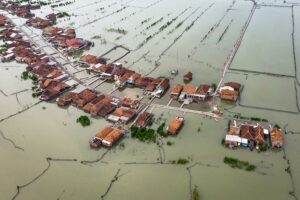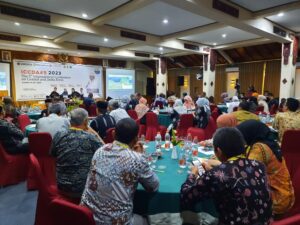About
Introduction
 Climate change has become an increasingly urgent global issue, affecting the environment, socioeconomic systems, and the well-being of communities worldwide. The impacts of climate change include rising global temperatures, sea-level rise, altered precipitation patterns, and the increased frequency and intensity of natural disasters such as floods, droughts, and storms. Socioeconomically, climate change exacerbates inequalities, disrupts food security, and poses health risks and forced migration, particularly for communities living in vulnerable coastal and delta regions.
Climate change has become an increasingly urgent global issue, affecting the environment, socioeconomic systems, and the well-being of communities worldwide. The impacts of climate change include rising global temperatures, sea-level rise, altered precipitation patterns, and the increased frequency and intensity of natural disasters such as floods, droughts, and storms. Socioeconomically, climate change exacerbates inequalities, disrupts food security, and poses health risks and forced migration, particularly for communities living in vulnerable coastal and delta regions.
Given the widespread and profound effects of climate change, significant efforts are required from various stakeholders, including researchers, policymakers, and practitioners, to understand and address these challenges. Research and the exchange of knowledge play a critical role in identifying adaptive and innovative solutions that can mitigate the impacts of climate change and enhance the resilience of communities and infrastructure. In this context, conferences provide an essential platform for exchanging knowledge, ideas, and the latest research results related to coastal and delta areas, environmental sustainability, civil engineering, urban and regional planning, and other related fields.

Building on the success of the 1st to 5th ICCDA, this conference has continued to expand its scope to address the unique challenges and innovations in resilience engineering through sustainable development, with a focus on climate adaptation and resilience. The upcoming 6th ICCDA 2025, themed “Advancing Climate Adaptation and Resilience through Sustainable Development in Coastal and Delta Areas,” promises to feature cutting-edge developments in these critical areas.
Participants can expect to engage in discussions on topics such as integrating renewable energy into coastal infrastructure, utilizing eco-friendly materials for climate-adaptive construction, and applying smart technologies for resilient urban planning in delta regions. The conference will also explore innovations in resilience engineering that strengthen the adaptive capacities of coastal and delta areas. The 6th ICCDA 2025 brings together experts, researchers, students, and practitioners from diverse disciplines, offering a dynamic platform for the exchange of knowledge, the presentation of new ideas, and networking opportunities. The event will also feature insightful presentations on the latest advancements in fields such as coastal and delta management, environmental sustainability, civil engineering, and urban and regional planning.
The Objectives
The aim of the upcoming conference is to provide a dynamic hybrid platform that ensures global accessibility, offering both in-person and virtual participation. The objective is to engage attendees in thought-provoking sessions, including plenary talks from internationally renowned experts, vibrant parallel panels addressing key issues in technology, engineering, environment, and urban and regional development, as well as a series of interactive events.
The Output
- Contributing ideas and innovations to enhance national resilience through sustainable engineering, climate-adaptive construction, and the application of technology and informatics in coastal and delta areas.
- Exchanging experiences and best practices on sustainability, green technology, and the use of informatics in addressing challenges in coastal and delta regions.
- Strengthening networks among institutions focused on sustainability, green technologies, and informatics for coastal and delta areas, fostering collaboration between universities, governments, and industry professionals.
- This version reflects the inclusion of technology and informatics while keeping the focus on coastal and delta areas.
The Expected Result
- Building a network of educators, researchers, and leaders who can collaborate to address challenges related to sustainability, green technology, and the specific issues facing coastal and delta areas.
- Offering a platform for participants to showcase their innovations, research findings, best practices, concerns, and approaches relevant to the conference themes.
- Fostering meaningful dialogue among educators, researchers, and leaders, both within and beyond the Unissula network, to enhance knowledge sharing and collaboration.
- Emphasizing potential synergies and connections among network members to strengthen future collaborations.
